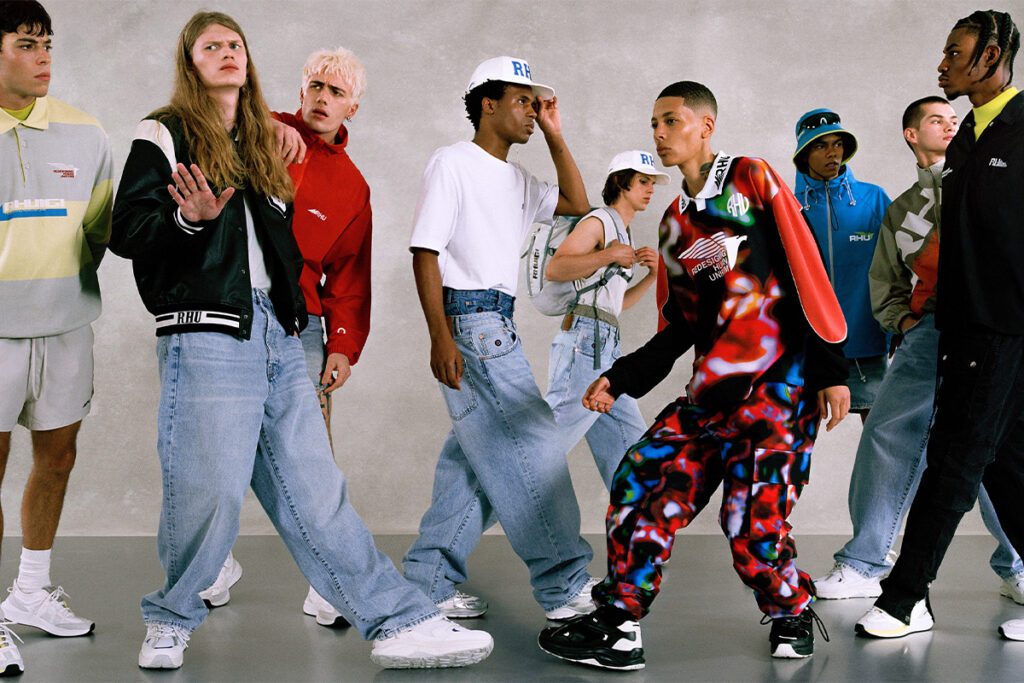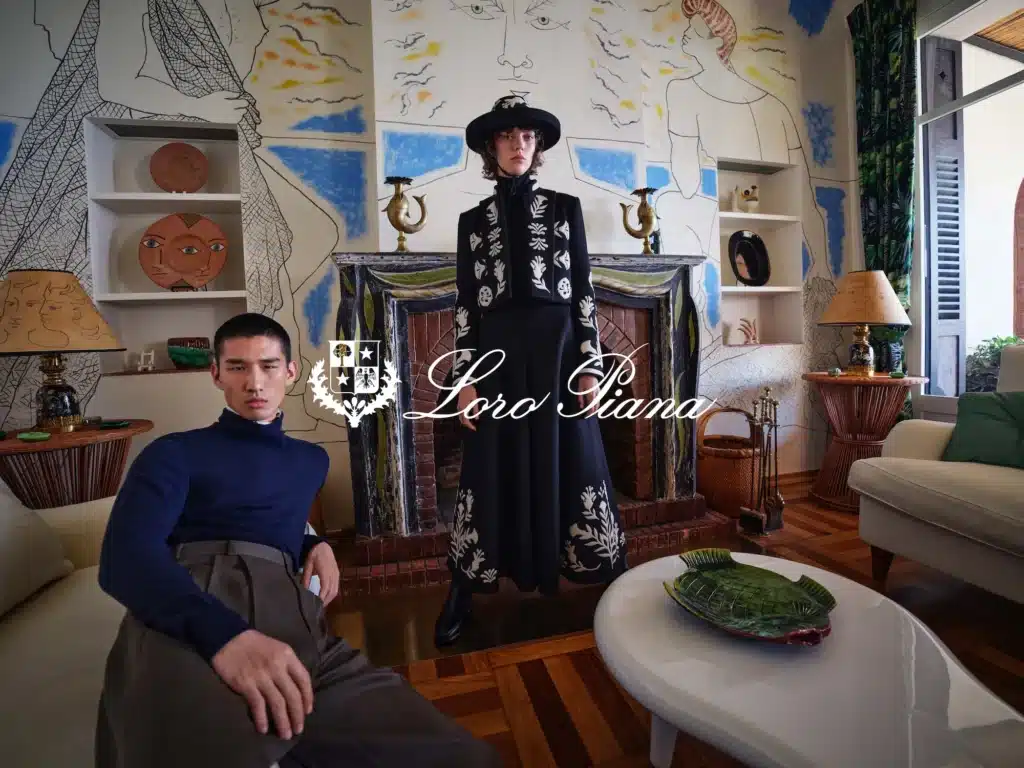Internal conflict at Rhude is spilling out into the open by way of a striking new lawsuit. According to the complaint that he filed in a California federal court on June 12 on his own behalf and derivatively on behalf of Rhude Designs, LLC (“RD”) and RVRG Holdings LLC (collectively the “Rhude Companies”), music agent and fashion entrepreneur George Robertson claims that Rhude creative director and fellow co-owner Rhuigi Villaseñor (and his personal company RMV Group) is on the hook for breach of contract, breach of fiduciary duty, fraud, conversion, and trademark infringement – and a minimum of $10 million in damages – in connection with his activities at the buzzy Los Angeles-based streetwear/fashion brand.
Setting the stage in the newly-filed lawsuit, as first reported by TFL, Robertson asserts that in 2016 (a year after Rhude was first founded), he and Villaseñor, now 32, began collaborating on the creative direction of the brand, which “quickly found widespread acclaim for its designs that balanced luxury with streetwear elements, [including] pieces that alluded to the Marlboro logo [and its] ‘traxedo’ pants, which combine track pants styling with high-end finishes.” Robertson claims that the “traxedo” pants, which he designed, “brought RHUDE into the mainstream and drove the majority of its sales in 2018, in addition to the RHUDE basketball sneaker, sunglasses, hats, socks, and shorts.”
Building the Brand
In connection with their partnership to build out RHUDE, Robertson says that he invested $50,000 in the brand in 2016, giving rise to his ownership of a 20 percent stake in the Rhude Companies, as documented in a 2018 operating agreement. Meanwhile, Villaseñor – who separately exited his role as Bally creative director last month after a relatively brief tenure – owns the remaining 80 percent, and the two parties “shared managerial authority” for the brand, according to Robertson.
Fast forward to 2019 and the parties’ relationship “began to sour.” Villaseñor “sought greater control and hoped to diminish Robertson’s role and eliminate his creative input,” Robertson claims, alleging that Villaseñor “improperly attempted to dilute [his] interests and took steps to freeze [him] out of the Rhude Companies.” This culminated in Villaseñor “eliminat[ing] Robertson’s access to company files” and “express[ing] his intention to dilute Robertson’s investments in the Rhude Companies” back in 2021.
“Diverted Funds,” Fraud & Trademark “Misappropriation”
In the meantime, Robertson says that Villaseñor has engaged in a scheme to “illicit[ly] divert” hundreds of thousands, “if not millions of dollars” in revenue from the Rhude Companies into his personal limited liability company, RMV Group. “Villaseñor consistently diverts what should be RD income to himself,” Robertson claims, noting that as a result, “RD’s revenue figures on its tax returns do not come close to matching Villaseñor public statements.” For instance, Robertson claims that while Villaseñor publicly stated that RHUDE’s revenue in 2020 was $30 million and in 2021 was “over $30 million,” RD’s tax returns reflect revenue of $10 million in 2020 and $18 million in 2021.
“This vast discrepancy is partly explained by Villaseñor’s diversion of RHUDE revenue directly into his own pockets” to fund his lifestyle, including “private jets, Ferraris and Lamborghinis, a home in the Hollywood Hills, extended stays in Italian villas, and a watch collection that includes several pieces worth more than $100,000,” Robertson argues.
At the same time, Robertson asserts that Villaseñor has “abused his position of power by causing RD to spend lavishly – and irresponsibly – on ‘advertising.’” For example: Roberts states that “in 2020, when RD’s tax returns reflected revenue of $10 million, they reflected ‘advertising’ expenditures of $2.7 million. That is to say, Villaseñor caused RD to spend roughly 27% of its revenue on advertising.” In 2021, when RD’s tax returns reflected income of $18 million, “they reflected ‘advertising’ expenditures of $5.4 million, i.e., 30% of revenue.” While the Rhude Companies do spend to advertise the brand, Roberts alleges that these “advertising” expenses are “bloated” to make up for Villaseñor’s practice of “charg[ing] his personal expenses to RD.” (For a point of reference, Roberston states that in the fashion industry, “advertising spending is typically 5% of revenue.”)
To make matters worse, Robertson argues that Villaseñor “even began infringing upon and diluting the Rhude Companies’ trademarks,” including by personally entering into collaborations, such as one with Zara, in connection with which he “design[ed] clothes emblazoned with the letters ‘RHU.’” Not only was the “RHU” branding “originally developed by RD for the Rhude brand,” but Villaseñor is also “improperly personally capitalized on the ‘RHUDE’ trademark and goodwill,” which is registered to/owned by the Rhude Companies, by way of the “Zara Rhuigi” collaboration. This use of the Rhude Companies-owned trademarks is part of a larger “unlawful scheme” by Villaseñor “to misappropriate and dilute” the marks “for his personal benefit,” Robertson contends.

Finally, when Villaseñor’s “misconduct,” including his alleged misappropriation of company funds and other assets, including the RHUDE trademarks, for his own personal benefit “became apparent” earlier this year, Robertson claims that he sent Villaseñor and the Rhude Companies a demand letter seeking, among other things, the company’s financial statements, books, records, and tax filings, given that Robertson lost access to company files back in 2021 despite maintaining his ownership stake in the brand.
Robertson states that he has received RD’s tax returns, balance sheets, and statements of profits and losses for 2017 through 2021. But as of the time of filing this lawsuit, Villaseñor still has not produced “all of the requested information, including the “books of account of the Rhude Companies’ business, RD’s financials for 2022, any information related to Rhude Holdings, or any information related to RHUDE revenue that was improperly diverted from the Rhude Companies to RMV and/or Villaseñor.”
Faltered Negotiations & an Ugly Lawsuit
Because of Villaseñor’s “repeated breaches, misappropriation, and misconduct” and in light of failed attempts to resolve this matter out of court (Villaseñor allegedly offered to pay Robertson $5 million for his share of the company in 2021 but negotiations “faltered”), Robertson says that he was left with little choice but to file this lawsuit “on behalf of himself and the Rhude Companies derivatively.” In furtherance of his suit, Robertson accuses Villaseñor (and RMV) of violating the California Corporations Code – which gives company members and managers the right to inspect company books and records and tax returns – by failing to produce the requested documents.
Robertson also accuses Villaseñor of breach of contract, as the Rhude Companies’ operating agreements that they are parties to similarly include a duty to produce the Rhude Companies’ books and records and tax returns upon request. Beyond that, he claims that Villaseñor further breached his contract by failing to observe the payment terms in the parties’ agreement; for instance, “while RD’s income nearly doubled [between 2020 and 2021], Robertson’s share of the partnership income actually decreased from $322,156 to $269,058.” At one point, Robertson says that Villaseñor publicly touted that the company’s annual revenues were greater than $30 million, and yet, it made distributions to him of just $41,000 per year.
Not done, Robertson also sets out claims of: (1) breach of fiduciary duty, alleging that “Villaseñor knowingly acted against the interests of the Rhude Companies and Robertson by diverting company resources and opportunities to himself and in connection with” various collaborations, including those with Zara, Puma, and Wiresonly, and by “divert[ing] the Rhude Companies’ income to himself” instead of the company; (2) conversion (Villaseñor and RMV’s conversion also “constitutes fraud, embezzlement, and misappropriation,” per Robertson); and (3) violations of section 496 of the California penal code for “substantially interfer[ing] with Robertson’s property by knowingly or intentionally taking possession of, and preventing Robertson from having access to, his share of the [company’s] available cash.”
Lastly, Robertson sets out a handful of trademark claims in his lawsuit, including trademark infringement and dilution, arguing that Villaseñor has made use of the RHUDE trademarks without authorization from the Rhude Companies. In terms of dilution, Robertson claims that by way of collaborations with Zara, for example, Villaseñor is “making business use in commerce of [trademarks] that dilutes and is likely to dilute the distinctiveness of the Rhude Companies’ [marks] by eroding the public’s exclusive identification of RHUDE with the Rhude Companies, tarnishing and degrading the positive associations and prestigious connotations of this [mark], and otherwise lessening the capacity of the Rhude Companies [marks] to identify and distinguish such goods.”
(As a side note, despite the allegedly sizable amount of advertising by Rhude, media attention to the brand, and a wide array of famous folks – from Jay-Z to Justin Bieber – wearing its designs, Rhude and its marks do not seem (to me) to rise to the requsitite level of fame to successfully wage a dilution claim.)
With the foregoing in mind, Robertson is seeking damages “in an amount to be determined at trial, but, in any event, a minimum of $10 million,” as well as restitution and/or disgorgement to the extent of Villaseñor and RMV’s “unjust enrichment or other ill-gotten gains,” among other things.
The TLDR Here: The co-owners of a successful but otherwise-likely-small fashion company (that may have grown too quickly and been lacking in proper management/oversight as a result) appear to be clashing over everything from operations to creative control.
A rep for Villaseñor did not respond to a request for comment.
The case is George Robertson v. Rhuigi Villaseñor, 2:23-cv-04622 (C.D. Cal.).














